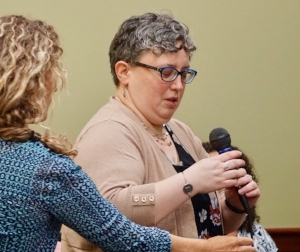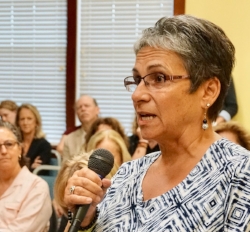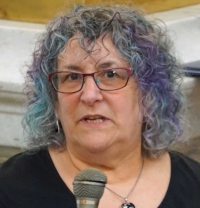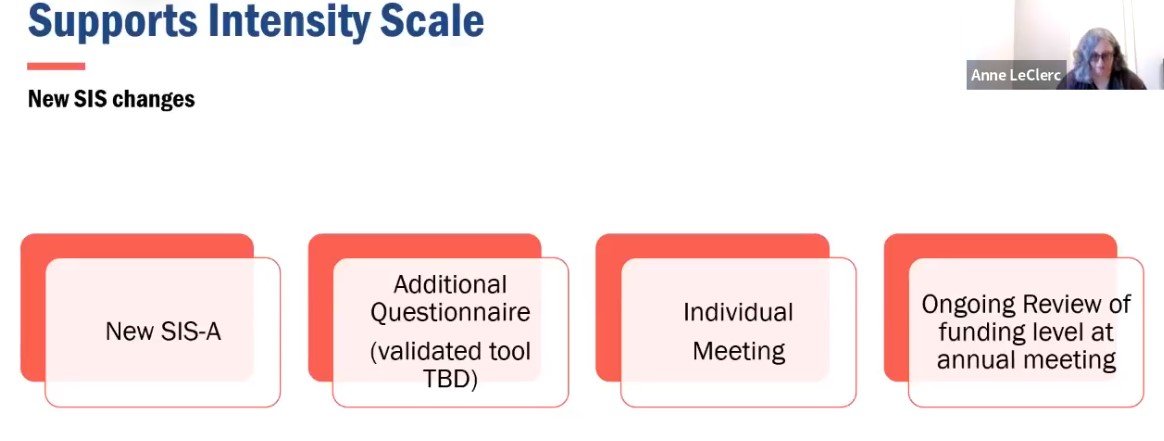Public Hearings Scheduled Sept. 18 On RI BHDDH Proposed Regulations
/By Gina Macris
Long-awaited revisions to regulations governing Rhode Island’s services for adults with developmental disabilities, as well as other functions of the Rhode Island Department of Behavioral Healthcare, Developmental Disabilities and Hospitals (BHDDH), are to be discussed in public hearings Tuesday, September 18, at the Arnold Conference Center in Cranston.
In the Division of Developmental Disabilities (DDD), the changes are intended to give providers the flexibility to better tailor services around the unique needs and preferences of each individual, according to Kevin Savage, the Director of Licensing at BHDDH.
On Aug. 21, before the proposed regulations were made public, Savage agreed to describe the purpose of the changes in general terms. He said he would be was prohibited from making any remarks once the public comment period opened. That happened Sept. 6, when the proposed regulations were posted on the Secretary of State’s website. Written comments will be accepted until Oct. 6.
An index with links to the rules proposed for adoption – and those proposed for repeal - can be found here:
On Sept. 18, the hearing schedule will be:
11 a.m. Developmental disability regulations
1 p.m. Licensing regulations for all entities that operate under the auspices of BHDDH
3 p.m. Behavioral healthcare regulations
The regulations are part of a broader context that includes standards of quality which developmental disability service organizations must meet to obtain and keep an operating license.
Until now, the standards of quality have been part of the regulations, which carry the force of law. But Savage, the BHDDH licensing director, has said that arrangement stifles the flexibility of providers to tailor services to the needs of individuals. Providers have also complained of lack of flexibility, particularly in light of demands of the 2014 consent decree which mandates integrated day services.
In the proposal, the standards of quality, or “certification standards” would no longer be part of the regulations, but instead serve as guidance about what organizations must do to become licensed or have their licenses renewed.
Here are links to the quality, or “certification” standards.
Day Services Employment Services Residential Services Shared Living Arrangements
Long-awaited revisions to regulations governing Rhode Island’s services for adults with developmental disabilities, as well as other functions of the Rhode Island Department of Behavioral Healthcare, Developmental Disabilities and Hospitals (BHDDH), are to be discussed in public hearings Tuesday, September 18, at the Arnold Conference Center in Cranston.
In the Division of Developmental Disabilities (DDD), the changes are intended to give providers the flexibility to better tailor services around the unique needs and preferences of each individual, according to Kevin Savage, the Director of Licensing at BHDDH.
On Aug. 21, before the proposed regulations were made public, Savage agreed to describe the purpose of the changes in general terms. He said he would be was prohibited from making any remarks once the public comment period opened. That happened Sept. 6, when the proposed regulations were posted on the Secretary of State’s website. Written comments will be accepted until Oct. 6.
An index with links to the rules proposed for adoption – and those proposed for repeal - can be found here: https://rules.sos.ri.gov/promulgations/organization/212
On Sept. 18, the hearing schedule will be:
· 11 a.m. Developmental disability regulations
· 1 p.m. Licensing regulations for all entities that operate under the auspices of BHDDH
· 3 p.m. Behavioral healthcare regulations
The regulations are part of a broader context that includes standards of quality which developmental disability service organizations must meet to obtain and keep an operating license.
Until now, the standards of quality have been part of the regulations, which carry the force of law. But Savage, the BHDDH licensing director, has said that arrangement stifles the flexibility of providers to tailor services to the needs of individuals.
In the proposal, the standards of quality, or “certification standards” would no longer be part of the regulations, but instead serve as guidance about what organizations must do to become licensed or have their licenses renewed. (links to standards.)
xxxxxxThe regulations are part of a broader context that includes standards of quality which developmental disability service organizations must meet to obtain and keep an operating license.
Until now, the standards of quality have been part of the regulations, which carry the force of law. But Savage, the BHDDH licensing director, has said that arrangement stifles the flexibility of providers to tailor services to the needs of individuals.
In the proposal, the standards of quality, or “certification standards” would no longer be part of the regulations, but instead serve as guidance about what organizations must do to become licensed or have their licenses renewed.
Long-awaited revisions to regulations governing Rhode Island’s services for adults with developmental disabilities, as well as those for behavioral healthcare, substance abuse prevention and treatment and state hospitals, have been posted by the Secretary of State’s office and are to be discussed in public hearings Tuesday, September 18, at the Arnold Conference Center in Cranston.
A link to new and old regulations is in the “What’s New” section of the website of the state Department of Behavioral Healthcare, Developmental Disabilities and Hospitals.
The first hearing, on rules and regulations for developmental disability service providers, is scheduled at 11 a.m. At 1 p.m., the discussion will shift to the licensing of all service providers and facilities that are funded by BHDDH. And at 3 p.m., there will be a hearing for rules and regulations governing behavioral healthcare organizations.
Written public comment will be accepted until Oct. 6.


























